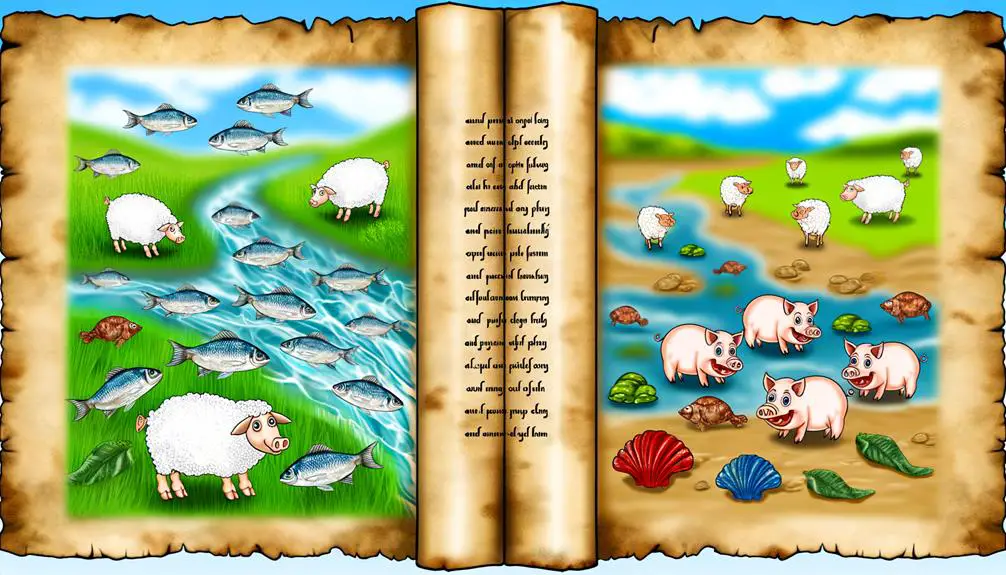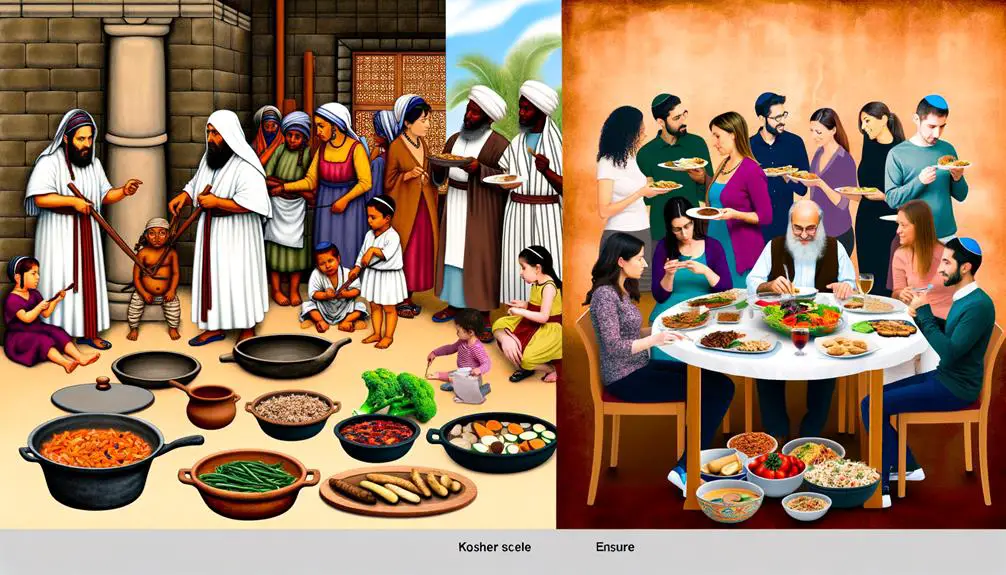Explore the spiritual and communal significance of dietary laws in the Bible, and discover how they shape identity and worship.

Clean and Unclean Food in the Bible
In the Bible, Leviticus 11 and Deuteronomy 14 outline the dietary laws distinguishing between clean and unclean foods. You'll find that clean animals typically have cloven hooves and chew the cud. These distinctions aren't merely about health; they symbolize the Israelites' covenant with God and set them apart from other nations. Each food's classification carries spiritual significance, embedding purity and holiness in daily life. The laws emphasize a holistic approach, linking dietary habits directly to worship and community identity. Understanding these nuances offers richer insight into how these ancient texts connect to broader divine and moral orders.
Key Takeaways
- Leviticus 11 and Deuteronomy 14 define clean and unclean foods, setting dietary boundaries for the Israelites.
- Clean animals typically have cloven hooves and chew the cud; unclean ones do not meet these criteria.
- The dietary laws, including prohibitions on pork and shellfish, symbolize spiritual purity and obedience to God.
- These laws served to distinguish Israelites from other nations, reinforcing their unique covenant with God.
- Eating seasonally and preparing foods according to these laws were seen as acts of worship and alignment with divine order.
Biblical Foundations of Dietary Laws

The dietary laws in the Bible, primarily outlined in Leviticus 11 and Deuteronomy 14, serve as divine directives that distinguish between clean and unclean foods. In exploring the historical context of these laws, it becomes evident that they were integral to maintaining the Israelites' distinct identity and spiritual purity. This separation was not only dietary but also a symbol of their covenant with God, setting them apart from neighboring nations with differing religious practices.
Scriptural interpretations further illuminate that these laws were more than mere health guidelines; they were imbued with spiritual significance. For instance, the avoidance of certain animals deemed unclean was linked to their behavior or characteristics, which were often antithetical to the values the community of Israel was encouraged to embody. Scholars argue that these dietary instructions reflected a holistic approach to worship, where even everyday choices like food consumption were aligned with a broader theological framework.
Thus, understanding these laws within their original biblical and cultural milieu is important. It lets you appreciate their role not just in ritual purity but in fostering a collective identity through shared practices that reinforced the moral and ethical pillars of the community.
Identifying Clean and Unclean Foods
How do we distinguish between clean and unclean foods as outlined in the scriptural texts of Leviticus and Deuteronomy? The sacred texts provide specific guidelines that resonate deeply with the culinary practices and seasonal rhythms. In Leviticus 11 and Deuteronomy 14, the criteria for land animals stipulate that only those which have cloven hooves and chew the cud are clean. This not only guides dietary choices but also influences cooking methods, as the preparation and handling of these meats require particular care to retain their purity.
Seasonal availability also plays an important role. The Bible hints at eating foods in their season, which not only maintains freshness but also aligns with divine order in creation. This affects both what is deemed clean and how these foods are to be prepared.
Here's a comparison to evoke the emotional and spiritual resonance of adhering to these laws:
Aspect |
Impact on Devotion |
|---|---|
Cooking Methods |
Enhances purity, honors God's creation |
Seasonal Availability |
Aligns eating with divine timing |
Through these practices, you're not just feeding your body but nurturing your soul, keeping in step with the rhythms established by the Creator.
Health and Hygiene Considerations

Beyond spiritual adherence, understanding the health and hygiene benefits associated with Biblical dietary laws offers practical insights for modern living. When you explore the restrictions outlined in Leviticus and Deuteronomy, it's clear that many of the prohibited animals harbored diseases or posed health risks to humans due to their dietary habits and living environments. For instance, the prohibition against eating pork can be linked to the prevention of trichinosis, caused by parasites found in undercooked pork.
Further, nutritional analysis of the foods labeled as clean reveals a diet potentially rich in lean proteins, essential fatty acids, and other nutrients beneficial for maintaining health. Fish with fins and scales, for example, typically have lower levels of mercury than bottom feeders like shellfish, which are labeled unclean. This distinction not only aligns with disease prevention strategies but also supports an ideal nutritional intake.
Religious Significance and Symbolism
In examining the religious significance and symbolism of clean and unclean foods, it's imperative to explore how these distinctions reflect deeper spiritual truths within Biblical texts. These dietary laws, as outlined principally in Leviticus and Deuteronomy, aren't merely arbitrary; they are imbued with layers of symbolic purity and are direct manifestations of Divine commandments. You can see how these laws transcend mere physical health, pointing towards a broader divine order.
The concept of cleanliness in these foods often symbolizes holiness and separation. For instance, the prohibition against consuming pork or shellfish can be interpreted as an allegory for avoiding morally impure actions or associations. This symbolic dimension emphasizes that what you consume not only affects your body but also your spiritual state. By adhering to these dietary laws, you're participating in a form of worship, acknowledging God's sovereignty and your own sanctity.
Moreover, the distinction between clean and unclean animals mirrors the broader Biblical themes of separation and distinction. Just as Israel was chosen among the nations, the dietary distinctions remind you of the need to make discerning choices aligned with Divine will. This act of obedience enhances your spiritual clarity and fortifies your commitment to walk in God's statutes.
Impact on Ancient and Modern Cultures

As you explore the impact of dietary laws on ancient and modern cultures, reflect on how these regulations have shaped societal norms and personal identities throughout history. Consider the transformations in religious practices and communal life that are traced back to scriptural mandates on clean and unclean foods, as noted in Leviticus and Deuteronomy. Analyze how modern adaptations of these ancient rules continue to influence contemporary dietary habits and spiritual observances across diverse cultures.
Dietary Laws' Cultural Influence
The dietary laws outlined in the Bible have profoundly shaped both the social fabric and personal identities of numerous cultures throughout history. These regulations have not only influenced spiritual practices but have also driven historical adaptation and culinary integration across communities. Ancient societies often interpreted these laws through the lens of available resources, leading to unique dietary customs.
Aspect |
Impact |
|---|---|
Social Structure |
Reinforced communal identity |
Health Practices |
Shaped approaches to cleanliness |
Culinary Arts |
Stimulated unique food traditions |
Understanding these influences can give you a deeper appreciation of how ancient wisdom has permeated modern cultural practices. By studying these impacts, you're peering into the fabric of human history, shaped significantly by what was deemed clean or unclean.
Modern Dietary Adaptations
Modern dietary adaptations reveal how ancient biblical concepts of clean and unclean foods have evolved to influence both age-old and contemporary cultures. You'll find that today's nutritional science often echoes these ancient separations, emphasizing the nutritional benefits of many "clean" foods, which are now known to be rich in essential vitamins and minerals. Similarly, the concept of unclean foods often aligns with modern allergy awareness, advising avoidance to prevent adverse health reactions. This intersection of ancient wisdom and modern science reinforces the cultural and health-related relevance of dietary selections. As you navigate your dietary choices, consider how these principles, established millennia ago, still serve to guide and protect public health in today's vastly different culinary landscape.
Religious Practices Evolution
Building on dietary insights, religious practices concerning food have similarly evolved, impacting both ancient and contemporary cultures profoundly. Historical shifts in these practices can be traced through scriptural texts and archaeological evidence, illustrating how dietary laws have adapted to new theological insights and societal needs. You'll explore, for instance, how early Judaic prohibitions on pork reflected not only health considerations but also a marker of identity and differentiation from neighboring tribes.
As you investigate further, you'll observe practice variations emerging with the spread of these faiths into diverse cultures. Christianity's reinterpretation of kosher laws under the New Covenant, for instance, allowed a broader dietary inclusivity, reflecting and shaping the evolving spiritual and social landscapes. These adaptations underscore the dynamic nature of religious practice and its enduring influence across epochs.
Contemporary Practices and Interpretations

In exploring contemporary practices and interpretations of dietary laws, one finds that believers often adapt ancient scriptural directives to align with modern ethical, health, and environmental concerns. This adaptation is particularly evident when considering modern allergies and secular views on diet. The Levitical prohibitions against consuming certain animals (Leviticus 11) were primarily rooted in notions of purity and divine command. Today, however, you might avoid these foods due not only to religious obedience but also due to health issues such as allergies. For instance, the prohibition against shellfish, once purely a religious mandate, now aligns closely with common severe allergic reactions in the general population.
Furthermore, secular perspectives often influence believers' choices, leading to a reevaluation of traditional dietary laws. While the Bible doesn't specifically address factory farming or genetically modified organisms, contemporary ethical discussions about these issues shape how you might apply biblical principles today. As a result, the command in Genesis to have dominion over the earth is now frequently interpreted as a call for stewardship and ethical treatment of animals, contrasting with historical practices of dominion that disregarded animal welfare. This shift illustrates a broader trend: interpreting ancient texts through the lens of current moral and social priorities.
Frequently Asked Questions
How Do These Laws Affect Interfaith Marriages and Dining?
How do you navigate dining dilemmas in interfaith marriages? It's about cultural adaptation and religious negotiations. Understanding and respecting each other's dietary laws can forge stronger bonds and enhance mutual respect.
Are There Exceptions for Medical Dietary Needs?
Yes, medical exemptions are considered within scriptural flexibility. You'll find that health needs can override traditional dietary laws, emphasizing compassion and practicality in maintaining wellbeing while respecting spiritual guidelines.
Do These Laws Influence Environmental Sustainability?
You'll find that dietary laws subtly influence both environmental sustainability and cultural impacts. Their economic effects are profound, shaping consumption patterns and agricultural practices through scriptural references that are both analytical and scholarly.
How Do Children Learn About These Dietary Laws?
Children learn through religious storytelling and community workshops, where narratives and practices are shared. Analyzing these methods reveals a deep-rooted educational structure that effectively transmits cultural and spiritual values across generations.
Are There Legal Implications for Not Following These Laws?
You're facing few legal repercussions for non-adherence outside religious communities. However, religious freedom allows cultural integration, balancing beliefs with broader societal laws, often devoid of direct legal penalties but with potential social or spiritual consequences.



Sign up